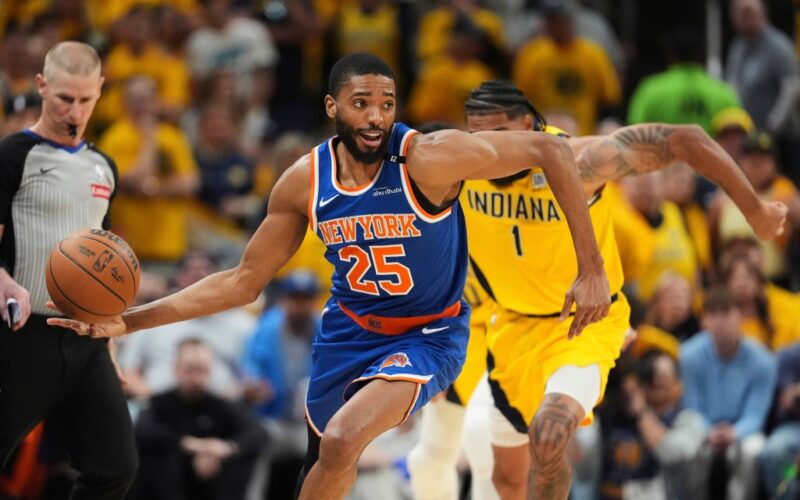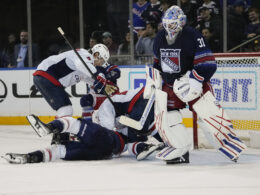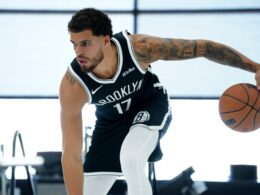Just how much is an NBA championship worth? The Knicks’ brain trust is about to find out.
Jayson Tatum’s Achilles tear only fast-tracked the inevitable — NBA franchises cost-cutting at high levels.
The Boston Celtics promptly traded Kristaps Porzingis and Jrue Holiday once Tatum’s injury rendered 2025-26 championship aspirations unlikely.
The Knicks will face a similar cost-cutting decision next summer — because they already have the third-most expensive roster in all of basketball, and that’s before factoring in two key extension decisions the front office faces this offseason.
Mikal Bridges and Mitchell Robinson are each entering the final year of their respective contracts. Bridges is eligible for a four-year, $156.2 million extension, and Robinson is eligible for four years worth $81 million.
The Knicks need to lock these extensions in soon because the price will only increase next summer should both players reach unrestricted free agency. Yet if the Knicks hammer home deals with Bridges and Robinson this summer, they will find themselves in a bind this time next year.
SALARY CAP NOT PROJECTED TO INCREASE FULL 10%
Many NBA front office members penned in a 10% increase in salary cap — and a 10% increase in both first and second apron levels year-over-year — as the byproduct of the league’s new media rights deal.
Yet ESPN reported the updated projections now hover at 7% not 10, and front office executives are using a $222.372 million figure as the projected 2026-27 second apron — not the initial projection of $228.6 million figure.
That’s an issue for the Knicks, who have been hard-capped at the second apron now two years in a row. If the Knicks reach extensions for both Bridges and Robinson, the payroll will check-in at $226.2 million. That’s $2.6 million below the old projection — and close to $4 million above the new one.
As a reminder, when a team crosses the second apron, they lose the ability to:
- access to their mid-level exception
- acquire a player in a sign-and-trade
- trade first-round picks seven years out
- use trade exceptions from previous seasons
- send cash in a trade
- plus their first-round pick gets moved to No. 3 if they are in the second apron in three out of five years
So if the Knicks reach extension agreements with Bridges and Robinson, they will be above the second apron with only 10 players under contract, not including Jordan Clarkson, who can leave as an unrestricted free agent after reaching a buyout agreement in Utah and joining the Knicks on a minimum deal this offseason.
SO WHAT CAN THE KNICKS DO?
First thing’s first: The Knicks can win a championship, because it’s hard to say no to cutting a check once the confetti has fallen and the parade is underway. The Celtics may have gladly eaten all tax payments and future second apron restrictions had Tatum stayed healthy and Boston repeated as NBA champions.
That is wishful thinking.
Now it’s on the Knicks in a wide-open Eastern Conference to prove they truly belong in the championship conversation. Cleveland, Orlando, Milwaukee and, yes, a healthy Philadelphia team would all like a word.
Second thing’s second: The Knicks can take a page out of Boston’s book, a likely pathway for any result short of an NBA Finals appearance this season. If the Knicks agree to extensions with Bridges and Robinson, they will have six players making $18 million (Robinson, Josh Hart, Bridges, Jalen Brunson, OG Anunoby and Karl-Anthony Towns) or more and four players making $34.8 million or more.
That means one — or two — could find themselves in new uniforms at the start of next season in the name of cost-cutting. The Celtics traded both Holiday and Porzingis and still find themselves a hair above the second apron this season.
There’s another path forward the Knicks can take: roster re-balancing, or trading a high-salary player for several new players due less money. A practical example: the Knicks could trade Anunoby, who is due $42.5 million in 2026-27 and $176 million over the next four years, for a combination of players on expiring (or near-expiring) deals and less lucrative salaries. Doing so could give the Knicks a mix of roster and financial flexibility — but at the cost of the most impactful defensive stopper the Knicks have on the roster.
The Knicks could also choose one: Bridges or Robinson — and given the cost of five first-round picks to acquire Bridges, retaining him would be top priority. Without an extension agreement, New York would be forced to trade Robinson ahead of the early February trade deadline or watch the rim-protecting big man walk for nothing as an unrestricted free agent next summer.
THESE ARE ALL TOMORROW’S PROBLEMS
Today, the Knicks’ focus is on winning a title this season. Yet the new CBA has ramifications forcing teams to think three steps ahead. The Knicks’ brain trust is at the top of the list: a team hoping to compete for a title this season that could find it very difficult to keep a championship-caliber core together moving forward.
Which means this is it: This is New York’s shot at winning it all. If the Knicks fall short — if they don’t win a title, let alone make a Finals appearance — pieces could be on the move at Madison Square Garden.








